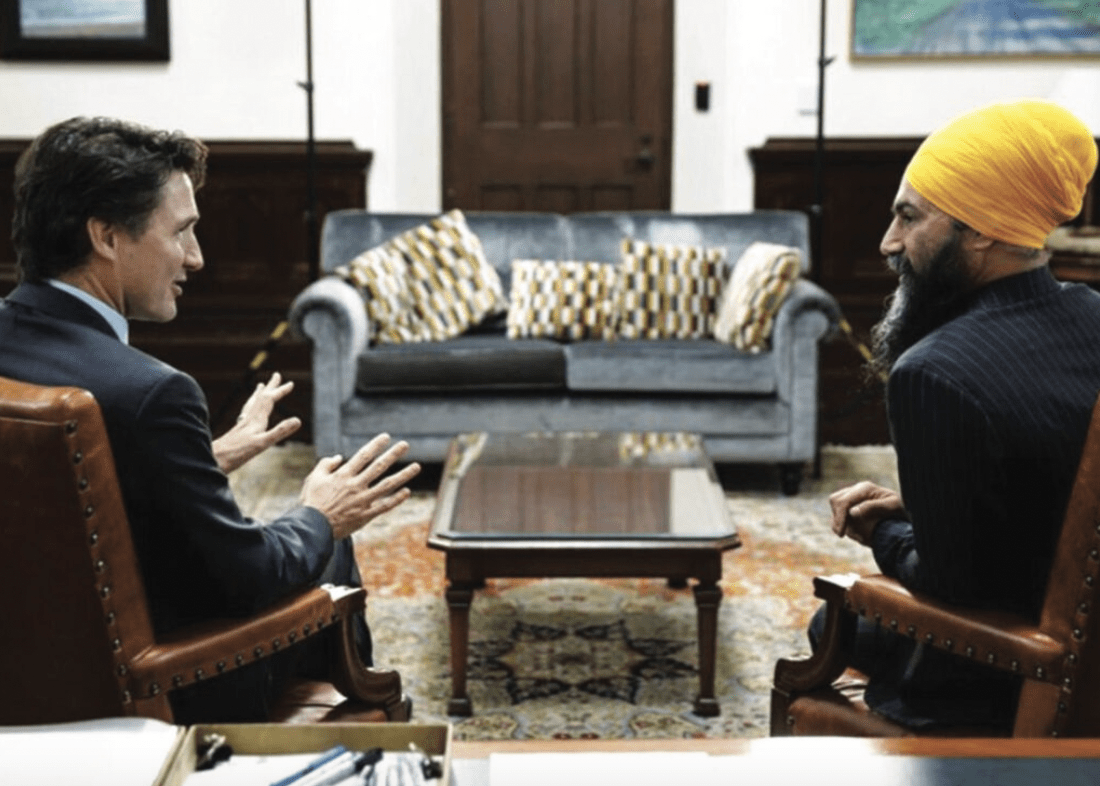The NDP-Liberal Dance of Distance
 Don’t sit so close to me: A scene not likely to be repeated with the next federal election looming/Adam Scotti photo
Don’t sit so close to me: A scene not likely to be repeated with the next federal election looming/Adam Scotti photo
By Brian Topp
December 31, 2023
Last week, federal NDP leader Jagmeet Singh announced that if Canadians elected a minority Parliament in the next election, his New Democrats would not join a coalition government with the Liberals as a sequel to the supply and confidence agreement that’s been in place since last year.
Former Manitoba Premier Gary Doer likes to say that some of the best election promises you can make are promises not to do things, and that’s what this is — a promise not to do something. A promise not to do something that seems quite safe, really, since such a coalition is not on offer.
But there is more to this. Singh is moving to pre-empt the coming Tory attack-line in Western Canada that a vote for the NDP is a vote for Justin Trudeau and the Liberal Party.
Two points arise — one a political reality, and one an interesting question of political strategy. The political reality: the NDP is currently doing best in the parts of the country where voters are least keen on its parliamentary accord partner — the Liberal Party.
Look at the provincial scene.
In British Columbia, the provincial Liberal Party (a powerhouse not too long ago) seems determined to destroy itself, and a provincial Conservative Party is on the march. Premier David Eby leads a cheerful, popular and competent BC NDP majority government that looks set for re-election.
In Alberta, the provincial Liberal Party has been annihilated, and the province is polarized between a new-model Alberta NDP that dominates the cities and a rural-centred know-nothing/kook/convoy/faux-populist government under Ms. Smith.
In Saskatchewan, the provincial Liberal Party has also been annihilated, and the Saskatchewan NDP under Carla Beck is increasingly dominating the cities, while a geriatric fourth-term Saskatchewan Party government is trying to defend its rural base by focusing on campaigning against schoolchildren.
If Singh is to capitalize on the current wave of provincial NDP success, he needs to manage regional views about his confidence and supply accord with Mr. Trudeau. Not repudiating the agreement while rejecting a coalition will be helpful (and a neat trick).
A similar conservative government focused on similar issues has just been evicted in Manitoba by NDP leader Wab Kinew. Kinew’s newly-elected majority NDP government is a wonderful piece of history-making on several fronts (I was his provincial campaign director and I put “be happy” in my calendar right through to this final day of 2023 in celebration).
The federal Liberal Party is doing better than their provincial Liberal cousins in these arenas. Prime Minister Justin Trudeau and his team are viable in urban BC. They have some prospects in Edmonton and Calgary. Things are grim for them in Saskatchewan. They have some prospects in urban Manitoba.
To be fair — if politics were fair — Mr. Trudeau would get more credit than he generally gets in western Canada. The previous Harper government talked the big tall talk and wore the big tall boots and the big tall hats, but Mr. Trudeau is the national leader who got the Trans-Mountain pipeline built — and on many other fronts has tried to reconcile western resource development with the toughest and most important problem the world faces — climate change.
However, to understate, many Western Canadians don’t see things that way. They care about their jobs and the future of their children, and have long memories about eastern-based political parties that in their view didn’t and don’t.
And so, if Jagmeet Singh is to capitalize on the current wave of provincial NDP success, he needs to manage regional views about his confidence and supply accord with Mr. Trudeau. Not repudiating the agreement while rejecting a coalition will be helpful (and a neat trick). That’s what Singh’s shoot-down statement was about.
There is an interesting point of political strategy here: what to do about predictable attacks from opponents?
There is a view held by some in the NDP that it is always, and in every case, a mistake to answer opponent’s claims and charges — that doing so only amplifies them. Better to stick to the “message box” and pre-canned tour. This view arguably did not serve the party well in some recent campaigns. Wab Kinew did the opposite in Manitoba this year, because his Tory opponents were making charges and blowing dog whistles he needed to knock down before he could make his positive case.
Political strategy is always situational. Mr. Kinew’s success in both proactively and pre-emptively rebutting his opponents isn’t a magic bullet in all circumstances for all time. But it worked in that campaign. And Mr. Singh is doing something similar here.
Singh can expect a wall of Tory vilification in western Canada on the topic of Liberals. What he had to say about it last week was smart politics. It delineated distance without disparaging a deal that has delivered for Canadians, among other things, a national dental care plan.
A small footnote: it’s a pity that our political system has evolved in a way that deters parties from working together in cabinets. It would be a good thing if all of our federal political parties had front-bench talent who had served as federal cabinet ministers. In most of the democratic world, members of most parties get an opportunity to serve in office in that way. But not here, not for now.
Brian Topp is a partner at GT & Company. He served as campaign director to Premier Wab Kinew in the 2023 Manitoba election. He also served as chief of staff to Alberta Premier Rachel Notley, as deputy chief of staff to Saskatchewan Premier Roy Romanow, and as national campaign director to federal NDP leader Jack Layton.
